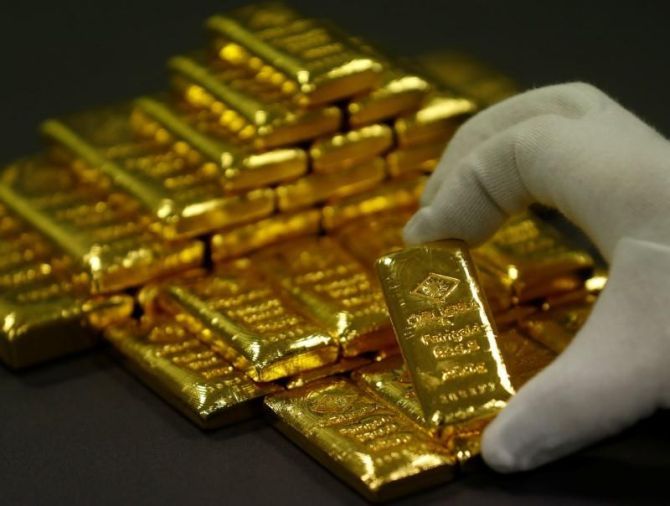India's gold demand rose 8 per cent annually to 136.6 tonne in the March quarter helped by a strong economic environment despite prices touching historic highs, according to the World Gold Council.

The aggressive gold buying by the Reserve Bank of India (RBI) also contributed to the rise in demand.
India's gold demand in value terms rose 20 per cent on an annual basis to Rs 75,470 crore during the January-March period of this year on volume growth as well as a rise in quarterly average prices by 11 per cent.
On Tuesday, the World Gold Council (WGC) released its global report 'Gold Demand Trends Q1 2024', showing that India's total gold demand, including both jewellery and investment, increased to 136.6 tonne in January-March this year from 126.3 tonne in the year-ago period.
Out of the total gold demand, the jewellery demand in India increased 4 per cent to 95.5 tonne from 91.9 tonne.
The total investment demand (in the form of bar, coin among others) grew 19 per cent to 41.1 tonne from 34.4 tonne.
Sachin Jain, Regional CEO, India, WGC, said the rise in gold demand reaffirms Indians' enduring relationship with gold.
"India's continued strong macroeconomic environment was supportive for gold jewellery consumption even though prices reached a historic high in March leading to a slowdown in sales as the quarter ended," he added.
Jain expects the gold demand in India to be in the range of 700-800 tonne during this year.
If the price rally continues, he said the demand could be at the lower end of this range. In 2023, the country's gold demand was 747.5 tonne.
Asked about the factors driving demand growth in January-March, Jain told PTI, "Historically, eastern markets of the world including India and China respond when the prices are going down and there is a fluctuation, whereas western markets respond when the prices are going up."
"For the first time we have seen a complete reversal where Indian and Chinese markets have responded to an increase in prices of gold," he said.
Jain said the demand for jewellery as well as investment products like bar, coin and ETF has gone up.
"The second reason for the increase in demand has been the buying by the central bank RBI," he said.
While the RBI bought 16 tonne of gold in the full 2023, it has already purchased 19 tonne in the first quarter of this calendar year, Jain highlighted.
He mentioned that the RBI has indicated that it would continue buying.
Asked about the outlook for the April-June quarter, Jain said the demand might slow down due to a sharp rally in gold prices and the ongoing election process.
As per the WGC data, India's gold demand in value terms rose 20 per cent to Rs 75,470 crore from Rs 63,090 crore.
Out of this, the jewellery demand grew 15 per cent to Rs 52,750 crore from Rs 45,890 crore, while gold investment demand went up 32 per cent to Rs 22,720 crore from Rs 17,200 crore.
The WGC also mentioned that the total gold recycled in India stood at 38.3 tonne in January-March, up 10 per cent from 34.8 tonne in Q1 2023.
"Total gold imports in India in Q1 2024 was 179.4 tonne, up by 25 per cent compared to 143.4 tonne in Q1 2023," the Council said.
The average quarterly price in Q1 2024 was Rs 55,247.20 per 10 gm of gold as against Rs 49,943.80 per 10 gm in Q1 2023 (without import duty and GST).
"Q1'24 also saw healthy levels of gold bar and coin demand in India, up 19 per cent year-on-year at 41 tonne.
"This was on a par with Q1'22, which was itself the strongest first quarter since 2014," Jain said.
The price correction in February sparked investors' interest, with anticipation of a rebound driving purchases, he added.
"As the price rallied to successive record highs, investors remained bullish, contributing to the robust demand," Jain said.
Investments into gold ETF too saw positive inflows of over 2 tonne.
"Although Indian recycling volumes increased 10 per cent to 38.3 tonne in Q1'24, there were very few reports of distress selling.
"With a strong economy and expectations of a normal-to-good monsoon, there seems little desire to cash in on high gold prices at the moment," Jain said.
The current high gold prices might temporarily put a strain on demand, he said.
However, Jain said, "strong cultural and seasonal factors such as festivals, weddings helped by an expectation for a better monsoon and solid economic growth would support demand."











 © 2025
© 2025